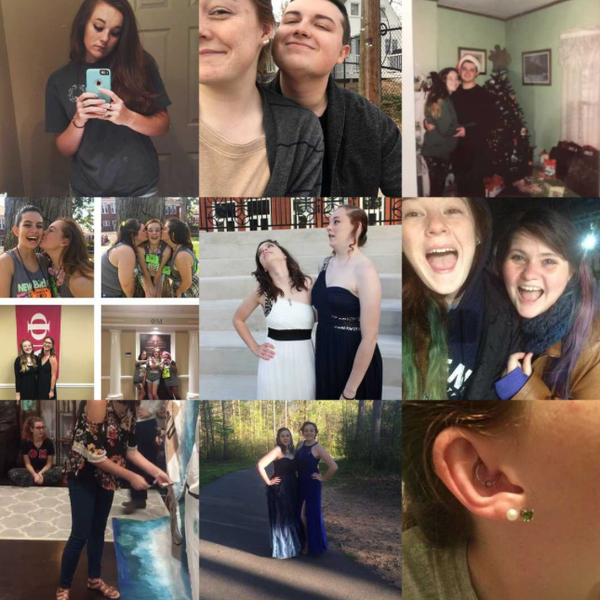I am considered a millennial. I am part of one of the youngest, brightest, and socially conscious generations there ever was. I am also part of the generation that supposedly needs "safe spaces", are whiny, and need everything given to them on a silver platter if we ask.
You know what I didn't ask for? My depression.
Now, for many older generations, my depression as a 20-year-old college student should be nonexistent. Several things I have heard include, "it's just teenage/young adult angst!" and "you're just working yourself up" and "Well, if you actually pushed yourself harder you wouldn't have depression!"
That's the thing: I live in a world where mental illnesses are finally being properly diagnosed, and many see it as "whining". Many believe that my depression isn't there. So, I'm here to explain what it is really like to have depression when you're a millennial.
Depression isn't pretty.
It's not a pretty girl becoming anti-social or a sad boy moping around. It's refusing to get out of bed to go shower. It's the inability to clean your surroundings, not because you don't want to, but you literally cannot muster up enough motivation to do it.
Recently, my depression reached an all time high with the change in seasons. As the change in seasons came, so did stress over college, friendships, relationships with others and family. It isn't always front and center of my mind some days, but it still lingers in the back of my mind.
During the day, when I'm with my amazing friends, my depression is just a nagging little annoyance. But when I'm alone, in my room, it becomes a monster. At first, I would cry so much that it would manifest itself into a panic attack. Then you just start to feel.... Nothing.
See, depression isn't just an absence of happiness. It is an absence of anything. Of happiness, sadness, anger, ambition, guilt.... It all just leaves. You're left with nothing.
So, you become an empty shell. You don't have the motivation to do your schoolwork, because why does it matter, right? Nothing good comes from it. So you just leave it, cause you somehow can't figure out how to move to your desk chair and finish it. Your room becomes a mess because all you want to do is sleep, so you just drop your stuff in the middle of the floor and crawl into bed. It's skipping meals because you can't muster up enough energy to go eat, even though your friends are begging to, and the only thing you want to do is nap the day away. You stop showering and go a week at a time before you see those tiled walls and actually wash your hair.
This is what I have had to deal with until I got help. My friends would beg me to go out with them, and I always wanted to, I just couldn't. I just would sleep through their plans with me. I started wondering how it would feel like to die.
I would never kill myself, of course. But that was because I didn't have the energy to. If I could've just withered away into nothingness, I would've.
You stop being the person who you were. Depression is a nasty thing. You stop enjoying the things you used to, you stop trying to keep up draining friendships, you just stop living. And this isn't angst, or overworking, or anything like that. I was just... there.
You will have your good days, too. Some days, you wake up and think "Oh, I'm going to get things done today!" and you actually put on makeup and clean your room and finish your assignments on time. But then, you slowly sink back to where you were. Those good days came few and far between for me. The sad part was, my good days were the days that I could feel anything... at all. I wasn't happy on my good days, but I had just enough energy to realize that I needed to clean, or fix my appearance or something. That's the thing with depression, your good days aren't normal good days, they're just normal adequate days to other people.
The first time I realized that I wasn't just overreacting and needing help, as a millennial, came on one of my adequate days. I had gathered up the energy to put just enough makeup on like I used to and run a brush through my hair. I walked into the dining area and all of my friends were shocked; they say "you look great! Who are you dressing up for?" and then I look at them oddly and they say "We just never see you like this..."
The second time I realized it was when I came home to visit my parents. As an only child, my parents always kept a doting and watchful eye on me, and we were all very close. Something I used to enjoy was playing video games after dinner with them, and I used to beg to play. These past few visits though, I would go into my bedroom and stare up at the ceiling, I just didn't even have the energy to watch TV. My dad walked in, asking if I wanted to get out of bed and play a game with them. I just shrugged and said, "I don't feel like it." He called my mother in my room and she goes "Lexi, baby, when was the last time you showered?" and I told her that it was way too much effort and I never could muster up the energy, I just wanted to sleep. At that point, I realized what I had become.
Now, it is still very hard to battle my depression. But it's an active battle. I can't idly sit by and let my depression overcome me and erase who I was. I still have my bad days but I have more good days, too. And, as a millennial, I realized that what I did need was a safe space...I needed a place to realize that what happening to me wasn't normal.
So, depression in millennials is very much real. It isn't very pretty. Sometimes it is actually pretty gross. But it is real, and it is valid.
This was my story, and I have heard so many others like it from other millennials. We are real, and we are valid. Our fights are long and hard, and sometimes we lose. But the thing with millennials is that we never stop trying. And as a millennial, I want you to know...We are the best and brightest here now. We will overcome depression.





















